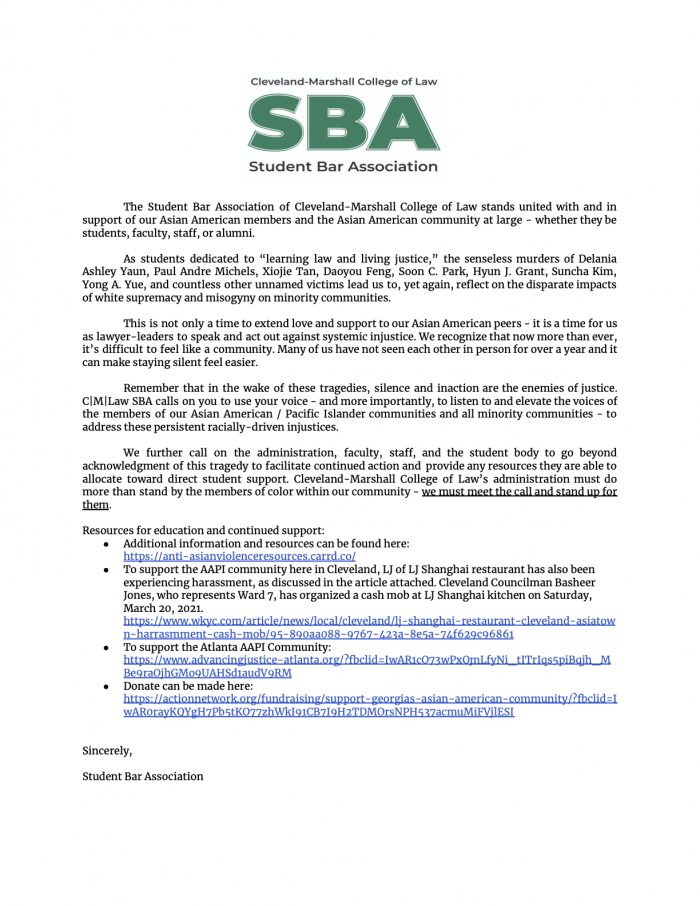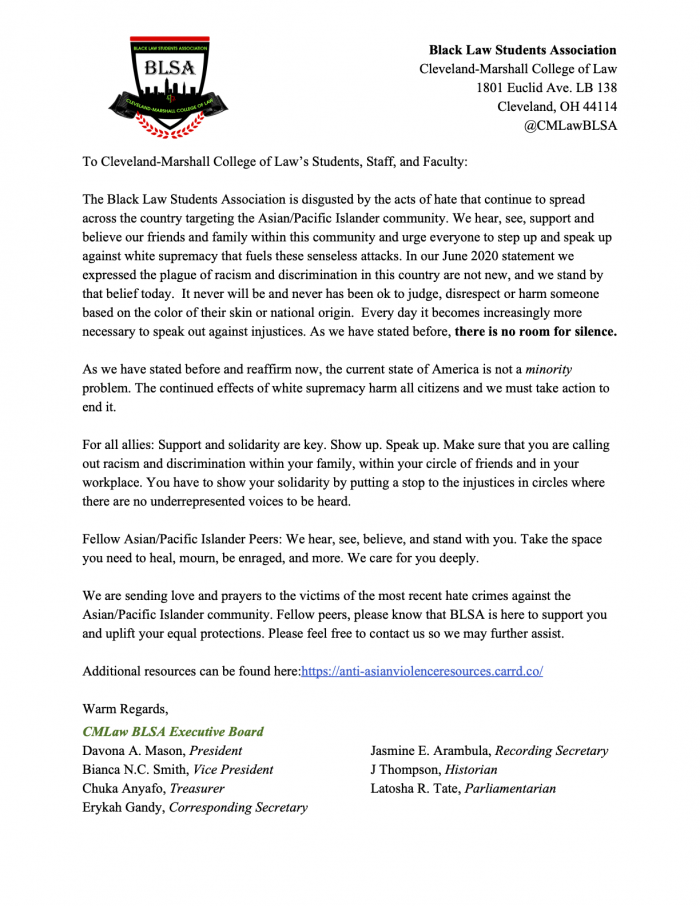A Message from Dean Lee Fisher
This morning I want to express CSU Cleveland-Marshall’s deepest support for the Asian American community. We unequivocally condemn the surge in anti-Asian violence throughout the nation, most recently with the shootings of six Asian women in Atlanta this week. We mourn their senseless murders. I call on all of us to join together as a C|M|LAW community to stand in solidarity with our Asian students, staff, faculty, alumni, and friends and stand up against anti-Asian hate and violence.
As I noted last June, we are committed to creating a community where all feel supported and valued and where each of us listen to the lived experiences of each other. Please reach out to me or any member of the C|M|LAW administration, faculty, or staff if you need support of any kind.
As I was writing this yesterday, I reached out to a close friend, Dr. Noel Harmon, President and CEO of Asian & Pacific Islander American Scholars, to help me find the right words at this moment. She told me, “One of the most important things we can do right now is to reach out to Asian Americans we know and care about, and see if they are okay and if there is anything we can do to support them. Not only does this validate the experience many Asian and Pacific Islander Americans are going through, it also allows our voices to be heard and our narratives amplified.”
We must acknowledge the fear and anger caused by these horrific acts of violence. We will not be silent as vicious hate crimes against Asian Americans take place on a daily basis. We know that many Asian Americans experience a pervasive sense of invisibility and marginalization, often treated like perpetual foreigners who don’t belong in the United States. We must recognize that if we do not speak out, Asian Americans will feel more isolated, unseen, disregarded, and alone. We must stand by, support, and lift up the Asian community now more than ever.
We condemn the irresponsible xenophobic and racist rhetoric that has infiltrated our everyday lives and has put a target on Asian-Americans. Referring to the coronavirus as the "Chinese Virus," "Wuhan Virus," or “kung flu,” is offensive, demeaning, and dehumanizing, and serves only to fan irrational bigotry and animosity towards Asian Americans. As Professor Reggie Oh has pointed out, dehumanizing any class of people inevitably leads to the infliction of violence and cruelty. This racial dehumanization must stop. I have spoken with Professor Oh and Professor Angelin Chang, and they will organize a virtual panel discussion on anti-Asian racism and violence in the near future.
In recent months, incidents of physical and verbal assault against people of Asian heritage have increased precipitously across the country. According to Stop AAPI Hate, a national coalition focused on combatting the rise in racism against Asian American Pacific Islander communities during the COVID-19 pandemic, more than 4,000 incidents of anti-Asian hate have been documented across 50 states and the District of Columbia.
That is just the tip of the iceberg. Many acts of hate violence go unreported, and more than 30 percent of Asian American adults say they have experienced interpersonal racism since the pandemic began, and one in four youth members of the community have also reported experiences with racism. As schools begin to reopen, Asian American families are choosing to keep their children home at disproportionately high rates, fearing the same discrimination will be levied against their families. Just yesterday, in Queens, NY, an incident was reported of an Asian American boy who had basketballs thrown at his head and was told to “go back to China.”
While racism against Asian American Pacific Islander communities has exponentially risen amidst the global pandemic, anti-Asian racism is nothing new. Asian Americans have experienced a brutal history of anti-Asian sentiment ever since they stepped foot in the United States in the 19th century, from the Chinese Exclusion Act of 1882 to the internment of Japanese American citizens during World War II, to the day-to-day acts of racial humiliation and violence Asian-Americans are experiencing today.
As the author of Ohio’s Hate Crime law, I know that violence against Asian American communities is part of a larger system of violence and racism against all communities of color, including Black, Brown, and Indigenous communities, and that hate must be combatted every day. Each of us has a role to play in fighting hate and racism and building equity, diversity, and inclusivity through education and our everyday actions.
Lee Fisher, Dean
CSU Cleveland-Marshall College of Law
Statements from our CSU C|M|LAW Student Organizations:
Student Bar Association

Black Law Students Association

CSU C|M|LAW National Lawyers Guild
Fellow Law Students,
As we have many times this year, as a country we are experiencing not something new, but a historical act of violence specific to a particular minority. In this instance it directly affects members of the Asian-American community. On Tuesday, in an Atlanta suburb a white gunman murdered 8 people, 6 of whom identified as Asian women. The National Lawyers Guild (NLG) Chapter at CSU is issuing this statement to stand in solidarity with our Asian student colleagues at the university, all students of color, particularly those who identify as women of color, and inform you about an action item we wish to take to better understand this issue. We see this happening. We value you, and we stand in support of you.
Context: White racism against the Asian population has deep roots in the U.S. From the sub-human conditions during the building of the railroads, the Chinese Exclusion Act of 1882 (banning Chinese immigration to the US), our imperialist history in the Philippines, Japanese concentration camps during WWII, to the recent politicized rhetoric surrounding the pandemic and the resulting spike in violent attacks on Americans of Asian descent. These are just a few touch-points in our history, and this discrimination remains present today. In fact, on Monday, days after the Biden administration condemned violence against Asian communities, and a day before the violence in Georgia, 33 Vietnamese refugees were deported, in violation of a bilateral agreement between the U.S. and Vietnam governments.
In order for healing to be addressed by the majority, race-based crimes like the one that occurred in Georgia must first be acknowledged as race-based crimes. Right now there is a debate among law enforcement as to whether to classify the gunman's violence as a hate crime or a murder based on his confession in which he claims he was motivated to target the victims due to his own sexual proclivities, rather than their race. The inability of law enforcement to swiftly see this for what it is: a crime rooted at the intersection of racism and the fetishization of minority women by white men, is very hard to accept. Quite obviously the details of this crime touch on a variety of issues, including but not limited to: race, gender violence, immigration work culture, toxic masculinity, and the political climate. The NLG-CSU does not pretend to be experts on these issues, but as a guild of future lawyers committed to fighting injustices within the legal system, we need to understand the legal context and implications.
In the coming weeks we will organize a discussion on the issue: What Makes a Hate Crime a Hate Crime, and How Might Neglecting to Add the Hate Crime Charge Impact Minority Communities? Please keep an eye out for more details on this event.
In the legal community, the ABA reports that Asian-Americans represent only 3% of lawyers in the field overall. According to the CSU's most recent Book of Trends, 2% of the entering law class is Asian (3.4% of CSU’s population is Asian), as a subset of the overall 23% of students of color compared to the 77% of white students. We therefore acknowledge that Asian students, and students of color are generally occupying predominately white spaces in the law school, which may lead to feelings of invisibility. Particularly, during this time of heightened stress, trauma, and shock for the Asian community, we encourage all students to offer support and extend compassion to each other and be mindful about how we interact in these spaces.
In solidarity and community,
Emily Forsee
On behalf of the National Lawyers Guild at CSU
Arab Law Student Association
To the CMLAW community,
The Arab Law Student Association is incredibly saddened, disgusted, and outraged by the murders of eight Asian-Americans in Atlanta, Georgia this past week.
Since the start of the pandemic, hate crimes and hateful rhetoric towards Asian-Americans have increased at an unbelievable rate. It is no surprise that these attacks have been in correlation with the increase of and proliferation of white supremacy that we have continued to see in America. While America has historically expressed systematic racism towards Asian-Americans, the Trump administration’s hateful rhetoric against Asian-Americans regarding COVID-19 has been an incitement and large motivation for the recent increase in hate crimes.
We must not ignore the role that white supremacy, misogyny, and systematic racism play in fueling this type of hate to our friends and family in the Asian-American community. Organizations such as Stop AAPI Hate have reported that there have been more than 3,800 reported hate incidents throughout the course of the pandemic. Reportedly, women, children, and the elderly have been most vulnerable to these crimes. Asian women have been twice as likely to have experienced and reported a hate crime as opposed to men.
Now more than ever, it is important that we stand with our peers, colleagues, friends, and siblings in the Asian-American community. We must be open to prioritizing, listening, and acting on behalf of those in the Asian community that are directly affected by these types of hateful acts. As law students, we must be advocates for others and we cannot afford to be silent in the face of injustice. Additionally, we must understand that Asian-Americans are not a monolith where a simple surname creates the indication of race or ethnicity and continue to stand with the entire Asian community and fight against white supremacy wherever it persists.
Lastly, it is important that we educate ourselves to be better allies and create a larger and inclusive community that we strive for, if we are to advocate for others truly and genuinely. For this reason, here is a list of resources that have statistics, updates, educational resources, places to donate, and allyship for those wishing to support:
In love and solidarity on behalf of the Arab Law Student Association,
Chance Zurub (He/Him/His)
President, Arab Law Student Association
Cleveland-Marshall College of Law
Statement from Cleveland State University
Cleveland State University Statement in Response to Attacks Against the Asian, Pacific Islander, and Desi American (APIDA) Community
All of us that represent our CSU community are saddened by the tragic recent shootings in the Atlanta metro area and strongly condemn the spike of violence against Asian, Pacific Islander, and Desi Americans (APIDA) since the start of the Covid-19 pandemic. We stand in solidarity with the APIDA community, and with all persons who are the victims of racism and hate crimes.
We stand against racism of any kind. As we mourn the loss of innocent lives in the horrific shooting in Atlanta, we want to reaffirm our commitment to creating a welcoming community of inclusion, and our recognition of the dignity, humanity and personhood of all members of the CSU community and beyond, with acceptance and respect for our differences in racial, political, or other social identities.
As we move forward as a community, we will continue to take great pride in our diversity and inclusiveness and will continue to support all students, faculty and staff to build a better and stronger university.
Sincerely,
